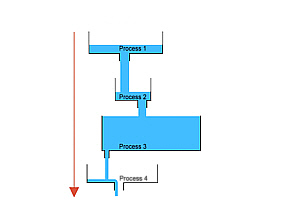
"Debt is the slavery of the free."
-Publilius Syrus
This article is a companion article to Treat Efficiency As A Currency.
Mention Work in Process (WIP) to anyone in your company and it is sure to elicit an emotion response. Most of production will desperately hold onto WIP, claiming they need every ounce of it to keep your operation running smoothly. Safety will claim it is a hazard that needs to be reduced. Your controller will lament all the capital tied up on shop floor. The quality manager will remind everyone of all the damaged and missing product associated with too much WIP. And your lean coordinator will denounce WIP as fervently as a baptist preacher giving a hell-fire sermon. So which perspective is right? All of them unfortunately.
Work in progress must be controlled for all the reasons listed above. It does tie up capital, creates safety hazards, adversely affects quality, and generally is a sign that your organization is not running at an optimal level. By same token, some WIP is required because of the flaws of your organization. Equipment breaks down, materials are late in arriving, and labor issues are valid reasons to need some WIP. The effects of WIP can also be compounded because our production schedules are often very unbalanced with varying tact times, requiring us to keep more WIP than we would otherwise like.
So how do we control WIP? Treat it as if it was debt. Racking up $20,000 in credit card debt going on vacations and buying things we don't need is bad debt. Taking out a $200,000 loan to buy equipment that will double your business and can be paid off in 3 years in good debt. Just like with debt, you need to ask yourself everywhere you have WIP if that area is important enough that you would be willing to take out a loan to buy that WIP, because essentially you are. Here are some examples of good and bad WIP:
The most obvious form of good WIP is those associated with plant constraints. We need to have some WIP in front of constraints to ensure that it can always be operational and never waiting for raw materials. This is a key component to elevating a constraint in the Theory of Constraints, and is accomplished by managing with a Drum Buffer Rope setup. This is equivalent to taking out a business loan to increase your profits.
The other side of this is building up work in progress in non-constraint areas "just to keep people busy". This is the very definition of bad WIP and is the equivalent of credit card debt.
Because of a varying mix and a changing process times in a job shop, WIP is often a byproduct as lead operations build parts faster than later process can use, but eventually the faster work will eat up the WIP. It looks bad when you walk out on the shop floor, but it really may be required if your business is chaotic.
For example, in a previous position we had a mix of product that varied from 1 hr to 150 hrs process time running through the same value stream. When we switched over to fast running product, huge piles of WIP would build. However, once the faster moving product went in the station at the end of the process, the WIP would disappear very quickly. If we didn't have this WIP, we would run the plant completely out of work multiple times per week.
If the WIP is carefully monitored and controlled with the production schedule, and is needed based on how much TIME the pile of WIP represents, then the WIP is a needed business expense and would be similar to going into debt to replace the roof on your plant. You don't want to spend the money but you must in order to stay in business. If you have no control over the WIP because you have no control over your schedule or processes, this is a bad debt. Sadly, most job shops fall into the latter category.
Another form of good WIP is around a piece of equipment that is not a constraint, but must be run most of the time and has a lot of maintenance issues. This could also include equipment with very long lead time for replacement parts. This is only a temporary fix as this really should be address with Total Productive Maintenance (TPM) or with new equipment.
On the flip side, I will often see equipment that is infrequently run that has a lot of WIP and inventory it. The concern is the same, "What if it breaks down?" to which I respond "So What?" These problems can and should be addressed with scheduling and planning, not WIP.
Work in Progress that your customer is willing to pay for is not necessarily bad WIP. For example, partially machined products may be inventoried so that when an emergency order comes, the product can be completed much more quickly to service the customer. This is fine so long as the customer is paying for it, because if they are not, you still are. Some companies my be willing to eat this expense simply to service important customers, making this the equivalent of going into debt to buy advertising.
This isn't meant to be an exhaustive examination of work in progress or it's pitfall, but instead an introduction into a new way of thinking. Much like thinking of efficiency in terms of currency, it is very valuable to treat WIP as a form of debt when examining it in your organization.






